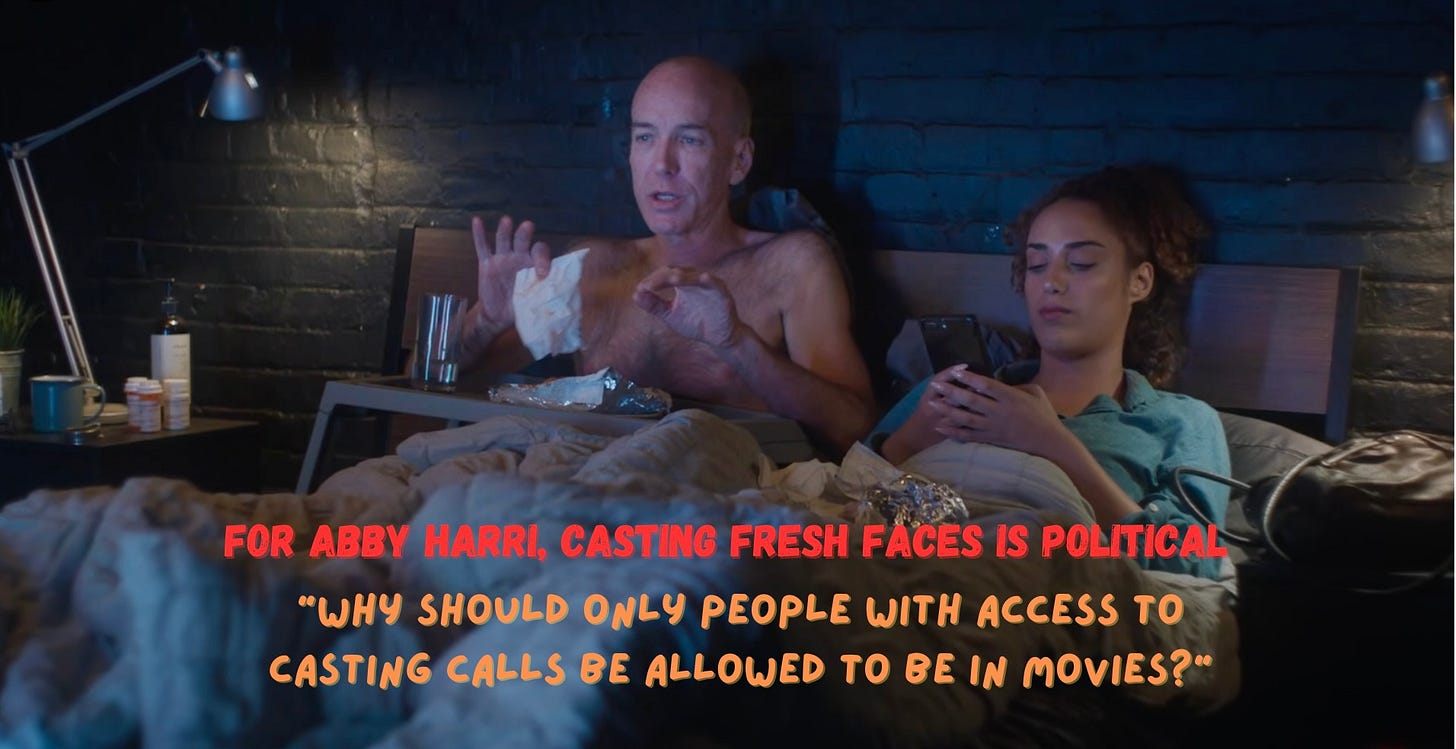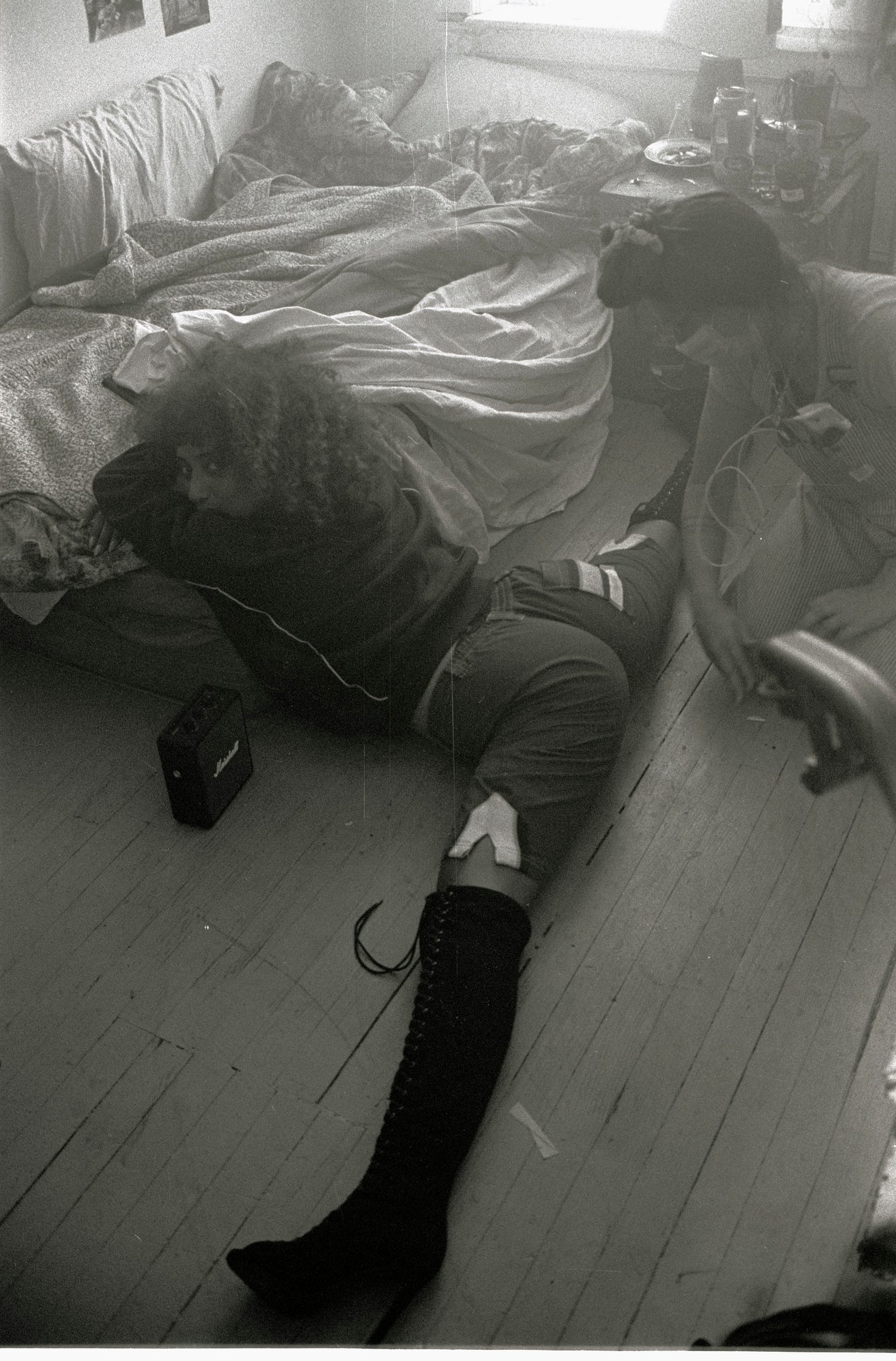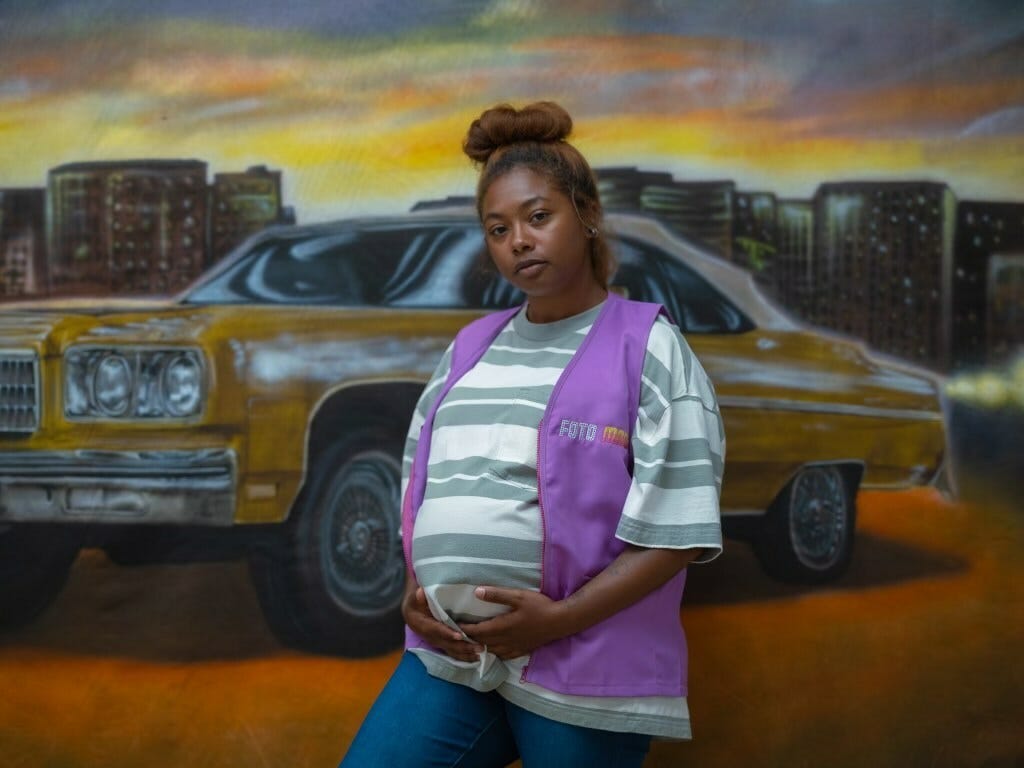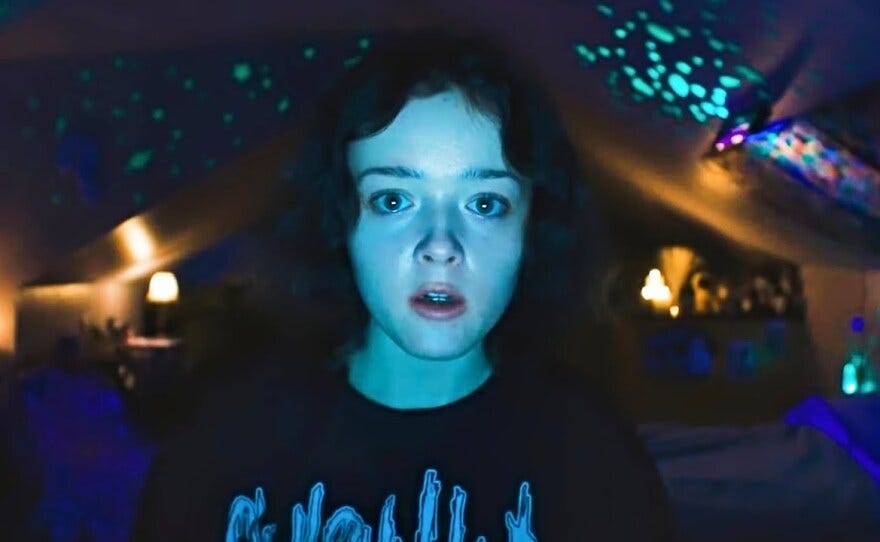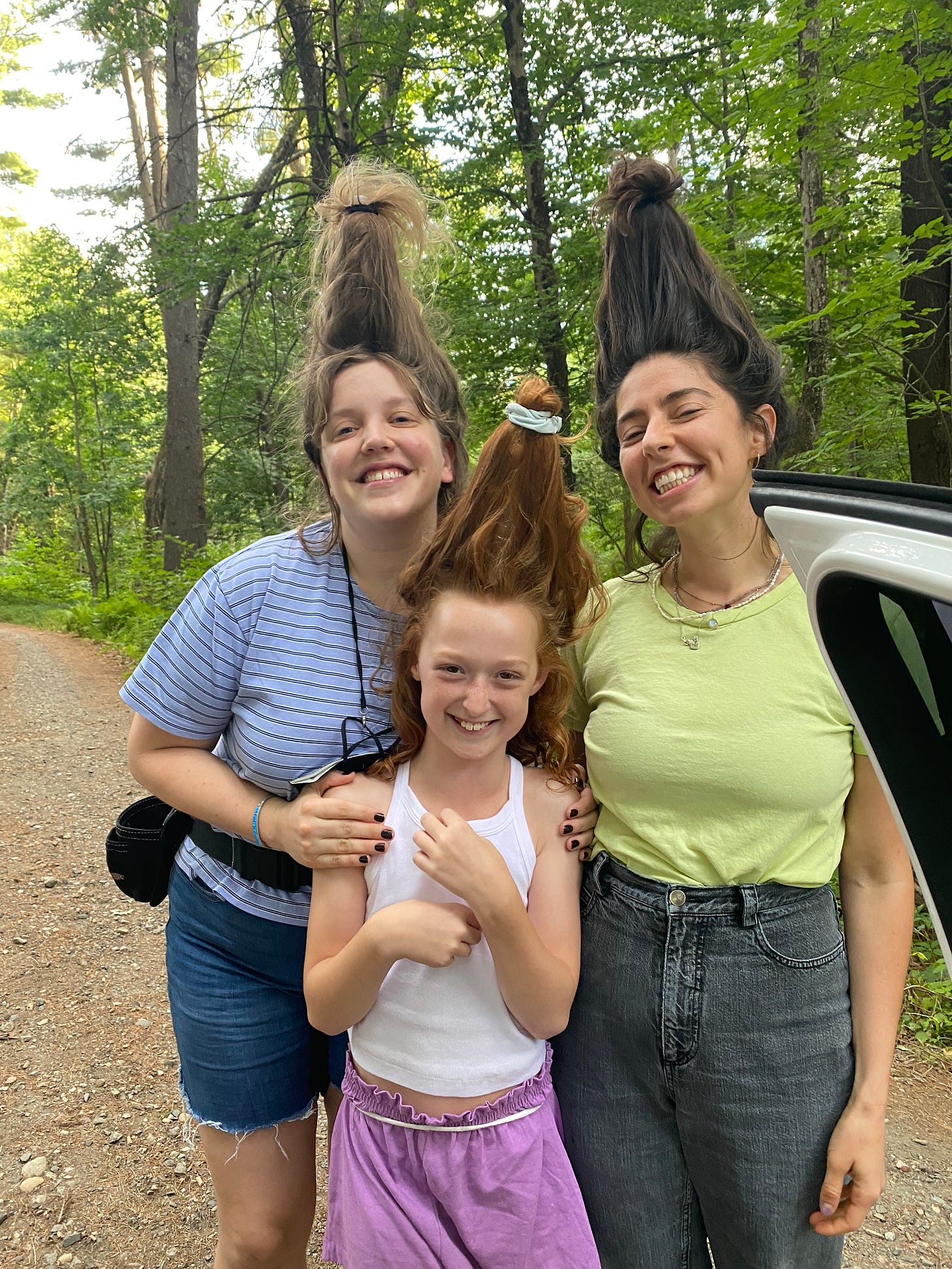Searching for Something Deep and Real
Abby Harri discusses her approach finding magnetic talents in movies like 'Janet Planet,' 'Earth Mama,' 'We're All Going to the World's Fair,' as well as in her short film, 'Side Hustle.'
Searching for Something Deep and Real
Abby Harri has helped discover magnetic talents in movies like 'Janet Planet,' 'Earth Mama,' 'We're All Going to the World's Fair,' as well as in her short film, 'Side Hustle.' We talk about how she approaches scouting and working with actors.
In the mid-2010s, Abby Harri was living in New York and struggling to get by. She was making minimum wage working at a burger restaurant in Park Slope and patching together other low paid gigs in the film industry. Making rent was stressful, and she barely had any time to do the creative work she was ostensibly in New York to pursue. “I was like, ‘How is everyone making creative work with this much stress over making rent?’"
She came to learn that a lot of people who did not come from money were doing various forms of sex work. “A lot of the media that existed at the time was either around sex workers who worked on the street or high-end escorts, like the TV version of The Girlfriend Experience (2016), which I love,” Harri says. “But I didn't realize that people who were more like me were doing this work, specifically young creatives.”
This realization inspired what would become Side Hustle, Harri’s 2023 short film about a dancer who sugars to pay the bills and allow her to pursue her art. The film, which stars Eden Martinovsky as the dancer and Sean Edward Lewis as the John, was born out of interviews Harri did with different sugar babies and Johns. And it depicts the relationship with incredible nuance and pathos. Sugaring, in Side Hustle, is clearly work, but there are also genuinely tender moments between these two people.
Before directing the film, which helped land Harri on Filmmaker Magazine’s 25 New Faces list in 2023, Harri worked primarily as a casting director. She helped discover exciting new talents like Anna Cobb (We’re All Going to the World’s Fair), Tia Nomore (Earth Mama), and Zoe Ziegler (Janet Planet). If there’s a throughline between her directorial and casting work, it’s how alive and honest the performances are. I’d long been wanting to ask Harri about her approach to finding and coaching such superlative performers. And with Side Hustle just having premiered online, now seemed like a good time to chat. Our conversation touches on where Harri likes to scout, why she feels so passionately about finding unknowns, and how she goes about helping directors find what they’re looking for.
Once you decided you wanted to set the film in this world, how did you figure out who the characters would be?
Figuring out who the characters were was partly inspired by my own experience. I wanted the main character to be someone who was a little depressed and messy, just getting by, living in an apartment that someone like me would have actually been in. We found this special space out in Sunset Park and felt like she’d be living that deep in Brooklyn, cause it’s cheaper. Her bed had to be most of her room.
I knew I wanted to see a practicing creative in the role, though I was open to whatever their art would be. So the writing and casting blended together for me in terms of character. The lead, Eden Martinovsky, was a dancer and choreographer, so that’s what the character’s art became. It was totally imbued with her.
There was a similar process with the sugar daddy. Initially I thought I was going to lean more into the type of guy who's more self-centered and wants someone to talk at. Not necessarily aggressive but definitely an alpha personality. Then when I met Sean [Edward Lewis], he just had this palpable vulnerability that was right there in our meeting. It really moved me meeting him. Because that strength of his is so present and more interesting to me, I wanted to craft the character around him. I saw Sean working really well as more of a shy, awkward guy, similar to the character in the comic memoir Paying for It. Someone who needs the other person to pull intimacy out of him and who has a hard time figuring out how to navigate more traditional relationship setups.
Their relationship is so tender in the film. How did you find their dynamic with them? Did you rehearse?
We did rehearse. I do casting, but I also do acting coaching with non-actors, which I kind of just taught myself. I feel like the biggest hurdle is everyone releasing a little bit of tension and being like, "Ok, we're all here for the same reason. How do we get comfortable with each other and chill out a little bit?" Everyone is inevitably really nervous and worried about how they're going to be portrayed.
With them, I wanted not just rehearsal but hanging out. It's similar to when you're meeting a new friend and you're sussing each other out and figuring out what's safe to say, what you both laugh at, what jokes are funny to them. So we just hung out at a bar at first and shot the shit. But it was such an amazing experience witnessing them coming together for the first time because I was just like, "Oh my god, this dynamic is so amazing and funny." One of the things I heard a lot from sugar babies was that the guy just wants to have sex for fifteen minutes and then for the rest of the night they’re talking about World War II. [Laughs.] And in that first meeting, Sean started talking to Eden about this BBC World War I documentary. It was just like life reflecting art reflecting life, a surreal moment. She was kind of nodding along but not that engaged, and I was like, "This is the scene in the movie." But they were also genuinely having fun together too. I walked away from that with my face hurting from smiling so much.
So then it was about us hanging out and building on the dynamic they already had with the goals of the film in mind: her character wouldn't hang out with him if she didn't have to, but she doesn't hate him either. There's so much complexity in any relationship, but add this element to it where one person is being compensated to be there. There are a lot of similarities to any job but it also involves so much emotional labor and care.
How did you find the two of them?
Eden I had met years ago. She was living with a friend. The first time I met her she was wearing house clothes and then she put on this full length jacket with a fur trim and six inch pleaser heels to step outside to smoke a spliff. She had so much fucking steez. I was like, "Who the hell is this? She's incredible." I started following her on Instagram and a lot of the videos that are incorporated in the film are from around that time when she was more active online. Her videos were so funny, I wish I could’ve included more. It's like she tries to repulse you but is also so sexy, and she's really playing with that in an interesting way. Years after meeting her I did a traditional casting call and asked friends for recommendations and my friend who had lived with her was like, "What about Eden?" And I was like, "Oh, duh." And she was a dancer, so she fulfilled my goal of wanting someone with a creative practice. I couldn't get her out of my head, but she wasn't really interested in acting so I was just like, "I really want you to do this. I understand if you don't want to. But can we just talk on the phone before you decide?" And we ended up chatting for like three hours and loving each other. And as we had more and more phone calls she warmed up to the idea.
Sean I met through a theater actor who was recommended to me. He does experimental theater as a writer-director and actor. But he hadn't really been in any films before. I had been auditioning other people through more traditional means also, but the words sounded so strange. It's really weird casting someone else's work versus your own. You start to question if your writing is shit or if it's just not the right person. No shade to any of the actors. But with him, it didn't matter. I didn't really even audition him. I just knew there was something there I could work with, and I felt really confident in that.
A casting tradeoff I think about a lot is choosing between someone who might have something exciting about them but be a little bit rougher and someone with more experience who would be more consistent but doesn't necessarily have that thing. It seems like you gravitate towards people in the first camp. Is that right? And if so, what have the challenges of that been?
As a director, definitely. But it's not as much about experience level as it is about the person as an individual and what they're open to exploring. A lot of actors become closed off or set in a routine in such a way that they’re not open to exploring something deep, vulnerable, and tough. That's the meat of where I like to be. I feel kind of like a tear doula or something. But it's not necessarily about tears. I love the experience of helping someone else feel something in a space that feels safe and not where I'm extracting something from them. Where we're exploring this together and I'm hopefully giving them that too from my perspective. It's an exchange of openness and vulnerability. That's what makes it safe, that I'm doing it too. So for me it's more people who want to express something deep and real.
Personally I can be more drawn to people who have less experience. I think it's fun to work from a clean slate. But it doesn't have to be that. I think in terms of casting, every director is different and it's more about helping that director figure out what they need with their directing style. Some people may be more comfortable with someone who has a toolbox and can come with ideas. Maybe they're more of a camera person and really want to get deep with the DP versus talking to the actors a lot. Though, I think actors can spiral very easily if they don't have someone to be there with them in the process, which is an important consideration. But it's really a balance of figuring out how people want to work. The casting process starts to reveal that, especially if people are earlier on in their careers. First-time directors might not even know what their process is yet, so you're kind of figuring it out through who they respond to.
How do you figure out who will be willing to really get into it with you? Particularly if it's someone who won't audition for something.
If someone's not going to audition, I try to at least get a meeting with the director. Because you want to know if there's enough of an understanding between the director and actor where they can communicate. If they have a body of work already, you can watch it and see if they're doing the kind of work you're drawn to. From there, it's about if we as people jive. And not all of those relationships will be the kind of bleeding-heart, deep connection that I'm talking about, and that's totally fine. But it's more about, “Can we communicate as two human beings and feel like we have some mutual understanding?” And hopefully also connect on the content and point of the material and what we're trying to do. Are we trying to make the same movie?
On set, it sounds like you're very good at making the experience fun and collaborative. So what does that end up looking like?
I think being really explicit in the beginning that it's a safe space to express stuff and that nothing is a mistake when you're creating something. There's stuff that won't end up in the final cut but no one's going to see that. That's what can be so special and amazing about film. It's not like theater where you have to rehearse something so much and then every time you're on stage it's always gotta be something good. In film, we capture it once and we've got it. There's something really free about that. It means that people can try a lot of stuff out in the moment and if it ends up being interesting or sparking new ideas then it becomes an environment where you're generating a lot of good stuff. Yeah, making people feel like they're safe to do that and it won't be a mistake.
When you're acting as a casting director, how do you go about figuring out a director’s sensibility and what they're looking for?
Sometimes what people think they want is not what they choose, and that's totally fine. But you don't understand that until you go through the process with them. There's a lot of conversations about inspiration. We're looking at faces and comps for other movies and performance style. We're talking a lot about how they want to shoot it. Because the way that you're filming something could impact the style of performance, and therefore casting. If you're not going to be run-and-gun doc style and it's going to be run more like a traditional set but you want non-actors who can perform dialogue, it's going to take a lot of work to find people who are able to give a stunning performance from zero experience that is true to the dialogue. If it's looser and they don't care as much about the dialogue and the lines and they want people to speak in their own voices, then it's a little bit of a different process where maybe we're trying that in auditions and encouraging people to do that.
In terms of finding people who are not traditional actors, what does that process end up looking like for you?
I grew up super shy, so scouting is a really intimidating thing for someone who's socially awkward, because you have to go up to strangers and be like, "Hey, you look cool. Would you consider auditioning for a movie?" I think my love for cinema is what will drive me towards someone when I'm working because there's something so special about seeing someone out in the world and knowing they could be captured on quote-unquote 'celluloid' forever. That is a driving force for me. It’s almost political in a way. Because why should only people who have access to casting calls be allowed to be in movies? Some people find their way to it from a variety of backgrounds because they're so driven to do it, but there are other people who are just living their lives who maybe think about acting but don't even know where to start. I think it's cool to offer those people opportunities. I just try to follow my instincts of who is drawing me in at any given moment. It could be for a lot of different reasons — their look, their energy, what they're doing in the moment.
And often those are the most alive performances.
I forget who wrote this about Earth Mama, but someone wrote that Tia [Nomore], the lead of the film, almost ignores the camera. And I thought that was such an interesting comment. The truth is she's just not trained to find her perfect light in the camera and she doesn't care about that. She's so present. We could say it's both at the same time. But I love that. I love when someone isn't just trying to look beautiful, they're just as present as possible in the moment.
When you're looking for that person, where do you go looking for them?
It's a little bit of detective work. "OK, we're looking for someone like this. Where would they be hanging out in this town?" Other times it might just be, "Where is an event that has a lot of people outside?" A lot of county fairs will be great for that, or places like Coney Island. A lot of that is also happening online. And usually when you find one interesting person in a town and you see who they're connected to, it starts to expand from there. There are so many different routes. I feel like every time I do a new film, I'm designing what the process is.
When a director has a specific performance style they're looking for, how do those directors end up achieving that?
That makes me think of Janet Planet, because Annie Baker is a writer through and through. Her dialogue is very specific and she wants that to be what we hit in the film. I was the acting coach for Zoe, the lead on that movie. That was just the right alignment of casting. We didn't have to make Zoe into a different kind of performer. Annie cast her because of the kind of performer she is. She had it. For that, it was more about helping her feel more present and not needing to seek approval as much. So when someone is more particular about it, it's just a more rigorous audition process of finding the person who can do that. It's not necessarily about changing who someone is as a performer. It's about figuring out how to help their natural abilities shine and help them feel comfortable.
There's going to be a casting Oscar next year. How do you define Best Casting?
Does it feel like they found the exact right people for those roles? The reason why it's taken so long to get to the point where there's an Oscar for this category is it's such an invisible role. A casting director is doing their job well if you don't notice their work. If you can get lost in a film and feel like these people are the characters — and that's a mix obviously of acting, directing, and casting, and all this stuff. That's the tricky thing about the lack of respect for this craft: you're not seeing it most of the time. But it's a very creative role and super vital at the beginning of the process.
Do you have a next film you're going to direct?
I am working on a feature that's set in Minnesota, where I'm from. It's a much more personal story, so I think that'll be really interesting to cast and work on. Side Hustle is a world that I'm not personally a part of. So it'll be a whole new endeavor to explore that. But I'm really driven and curious and ready to just keep making work. I'm a little down about where the industry is right now, but ultimately I know this is where I'm supposed to be. So right now I'm just figuring out how to keep going.
Jobs, programs, and other opportunities
The Listings
Alex Bliss is looking to rent an apartment in NYC for two weeks in September for a film he is making. Preferably empty or near empty. DM @albertblimp on IG.
Applications are open through July 30 for Bronx Documentary Center’s ‘25 - ‘26 BDC Films Fellowship — a free, year-long program for early-career doc filmmakers from underrepresented backgrounds. More here.
Jess Zeidman is looking for extras for a scene in Human Theories on August 10 at MANSIONS (46-63 Metropolitan Ave, Queens, NY 11385). 10 AM - 4 PM. There will be food, drinks, lunch, dancing, techno, fun, and indie filmmaking! Fill out this form.
Recently, I created this spreadsheet for producers to consult when seeking crew, gear, or scripts to develop. If you’re looking for work or to find collaborators, sign up. It’s free.
No Film School recently published a massive list of summer film grants, labs, and fellowships. Check it out here.
If you would like to list in a future issue, either A) post in the Nothing Bogus chat thread, or B) email nothingbogus1@gmail.com with the subject “Listing.” (It’s FREE!) Include your email and all relevant details (price, dates, etc.).



